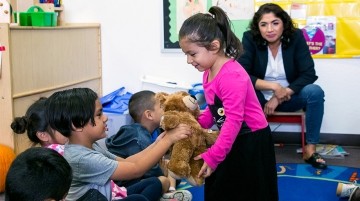Each year in the United States, 46 million children are exposed to violence, crime, abuse, homelessness, or food insecurity, as well as a range of other experiences that cause psychological trauma. These experiences create toxic stress that can affect children’s attention, learning, and behavior. Research on human development shows that the effects of such trauma can be mitigated when students learn in a positive school climate that offers long-term, secure relationships that supports academic, physical, cognitive, social, and emotional development — an approach known as “whole child” education. Indeed such an environment boosts achievement for all children, regardless of their circumstances.
Human relationships are the essential ingredient that catalyzes healthy development and learning.
Educating the Whole Child: Improving School Climate to Support Student Success, looks at a broad body of neuroscience, science of learning, and child development science to examine how schools can use effective, research-based practices to create settings in which students’ healthy growth and development are central to the design of classrooms and the school as a whole. These approaches can help children overcome toxic stress and trauma, including stereotype threats that undermine achievement.
The report summarizes evidence about the effects of positive school climate, social-emotional learning, and productive teaching strategies on achievement. It also identifies policy strategies that can foster these conditions and practices on a wide scale. While whole child approaches are ideal for all students, they are especially important for students living with trauma. The report provides key lessons from the sciences of learning and development, discusses the implications of these findings for schools, and explains policy and practice strategies to develop whole child environments.
The key lessons the report surfaces from the sciences of learning and development are:
• Development is malleable.
• Variability in human development is the norm, not the exception.
• Human relationships are the essential ingredient that catalyzes healthy development and learning.
• Adversity affects learning—and the way schools respond matters.
• Learning is social and emotional, as well as academic.
• Children actively construct knowledge based on their experiences, relationships, and social contexts.
Educating the Whole Child also discusses key priorities and strategies to develop productive school environments. They explain how practitioners can:
• Build positive classroom and school environments,
• Shape positive student behaviors,
• Use educative and restorative approaches to discipline,
• Provide supports for student motivation and learning, and
• Create multi-tiered systems of support to address student needs.
For policymakers, the report details the following policy strategies:
• Developing and assessing positive learning environments.
• Using school climate data to diagnose school needs.
• Helping schools improve climate and culture.
• Reducing rates of exclusionary discipline.
• Providing a multi-tiered system of student support.
• Investing in educator preparation and development.
And, finally, it makes three key recommendations:
- Focus the system on developmental supports for young people,
- Design schools to provide settings for healthy development, and
- Ensure educator learning for developmentally supportive education.
Educating the Whole Child: Improving School Climate to Support Student Success by Linda Darling-Hammond and Channa Cook-Harvey is licensed under a Creative Commons Attribution-NonCommercial 4.0 International License.
We are grateful to The California Endowment for its funding of this report. Funding for this area of LPI’s work is also provided by the Chan Zuckerberg Initiative, the S. D. Bechtel, Jr. Foundation, and the Stuart Foundation. Core operating support for the Learning Policy Institute is provided by the Sandler Foundation, the William and Flora Hewlett Foundation, and the Ford Foundation.
Photo copyright Drew Bird - www.drewbirdphoto.com
